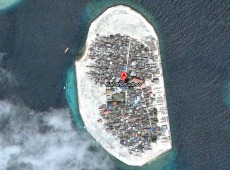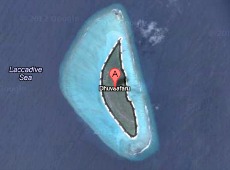The UNDP’s second Human Development Index (HDI) report for the Maldives urges stakeholders to address regional inequalities which remain a “major challenge” towards human development.
The first sub-regional HDI report of its kind, titled ‘Bridging the Divide: Addressing vulnerabilities, Reducing inequalities’ was officially launched today, analysing the disparities between the Malé region and the outer atolls.
“Where one is born within the Maldives determines many of the opportunities and choices available to a person,” reads the report.
“Remote islands with small populations have limited accessibility to services including schooling, healthcare, social services, job opportunities and face overall isolation.”
Since its first HDI report in 2001, the Maldives has graduated to middle income country status. Today’s report, however, noted that while the nation’s HDI score is 0.688 – placing it in UNDP’s medium development bracket – the regional analysis reveals stark inequalities.
While the atolls’ development was revealed to be 0.627 in 2012 – placing it in the mid-level HDI group, alongside countries such as South Africa and Indonesia – Malé’s HDI was 0.734, putting it in the high development bracket next to Azerbaijan and Mauritius.
Used as a measure to gauge people’s choices in life – accounting for access to education, nutrition, healthcare, security, political and cultural freedoms – Norway currently tops the Human Development Index (0.955), while Niger ranks last (0.304).
The global average HDI average is 0.694.
The Divide
‘Bridging the Divide’ notes that income and educational choices are the most notable of the inequalities faced by those born outside of the capital.
“A person living in Malé is likely to complete three years more of schooling than a person living in the atolls,” explained the report.
It was also noted that the average income for a person living in Malé – equivalent to US$4251.90 – is one and a half times that of a person living in the atolls.
The report noted that rapid internal migration to the capital Malé has itself become a cause of inequalities
“In-migration to Malé has led to a sharp increase in living costs, poor housing conditions, overcrowding, pollution and a general sense of frustration and impatience in the public.”
After categorising the Maldives into seven regions, the report showed regions 2 and 6 – containing Noonu, Raa, Baa, and Lhaviyani atolls in the north, and Gaafu atoll in the south – to be under performing.
The best performing region contained the central Meemu, Faafu, and Dhaalu atolls – reflecting the concentration of the tourism industry in the Malé area.
The HDI report recommends enhancing the benefits of of tourism – which has taken the Maldives from one of the world’s poorest nations in the 1970s to having South Asia’a highest GDP per capita today – to the wider population.
It was noted that the rich-poor divide was being exacerbated as the tourism industry “operates as a powerful oligarchy and has given rise to an elite class that owns much of the country’s wealth”.
While acknowledging the recent growth of the guest house industry, the report argues that the bulk of the luxury resort industry provides little opportunity for local small and medium enterprises.
Vulnerabilities
Core physical vulnerabilities identified in the report included the Maldives’ small land mass, lack of natural resources, while economic weaknesses focused on the heavy reliance on tourism and a high external dependence on imports.
Such vulnerabilities reduce the ability of institutions to address inequalities, with the report suggesting that solution lies in “building resilience through improved spatial planning, increasing targeting and effectiveness of social protection measures, restoring fiscal and macro-economic stability and diversifying the growth base.”
It was acknowledged that considerable improvements in poverty levels, life expectancy, and access to education had been assisted by “fiscal prudence” between the mid 90s to the mid 2000s which must return in order to continue the country’s HDI progress.
The effective targetting of vulnerable groups – those facing more than one impediment – is needed in order to design policies and programmes to address their development needs. The removal of blanket subsidies was one example of such a policy change.
The development of a hub and periphery model in the atolls – improving local services and relieving the pressure on the capital – was mooted alongside the completion of governmental decentralisation.
Finally, it was suggested that long-term thinking among political leaders – beyond a five-year election cycle – is key if human development is to be enhanced in the island nation.
“Political parties and political leaders need to start thinking beyond the ballot,” read the report. “With democratic transition, the country’s long-term development planning process has been side-lined.”
While noting that human developed requires a strong democracy, the report concluded by suggesting a reappraisal of the state’s “extraordinarily high costs”.
“For a small country like the Maldives, with mounting pressures, fiscal crisis and high debt distress, it is time that political parties, institutions, civil society and the public engage in debate; and agree to right-size the governance system, to make it more sustainable and to maximize the democratic dividend and enhance the freedoms and choices for the people.”

